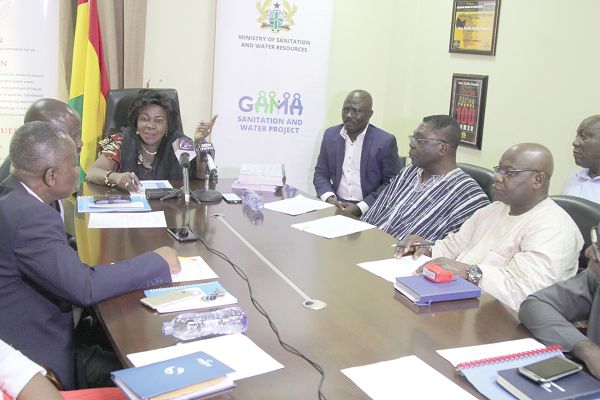
World Bank supports Sanitation Ministry - Will construct sewerage treatment systems
The World Bank has provided a grant of GH¢26.7 million for the Ministry of Sanitation and Water Resources to provide decentralised simplified sewerage treatment systems at Ashaiman New Town and Bankuma in Tema in the Greater Accra Region.
The projects are expected to start on March 16, 2020 and end in eight and six months, respectively.
They form part of the government’s effort to end open defecation in the country and the World Bank’s Greater Accra Metropolitan Area (GAMA) project to improve sanitation and access to water in the metropolis.
Under the project, faecal matter from homes will be channelled directly to treatment facilities, instead of the use of cesspit tanks.
Scope of work
The Ashaiman project includes the laying of more than 24 kilometres of sewer pipeline, the construction of 420 manholes and 4,805 household sewer connections.
Advertisement
Additionally, a pumping station and a waste water treatment plant to handle a projected 1,800 cubic metres of waste a day will form part of the system.
It is estimated that 4,805 households, with at least 37,500 people, within Ashaiman New Town and the TDC Quarters will be supported to have their household toilets connected to the decentralised treatment system.
The Bankuma project will include the laying of 5.1km of 160mm sewer pipelines, the construction of 96 manholes and 1,048 household sewer connections.
Additionally, a waste water treatment plant to handle a projected flow of 600m3 a day will be constructed.
The project is expected to benefit 12,700 people when completed.
Households are expected to pay a token as operational maintenance fees to ensure the sustainability of the systems.
Event
The Minister of Sanitation, Ms Cecilia Abena Dapaah, who signed the agreement for the project with the beneficiary municipalities in Accra yesterday, expressed gratitude to the World Bank for its continued support.
She said the two projects would build on some existing but defunct sewer infrastructure, such as the use of septic tanks, treatment plants and the home tension basin.
“An added advantage is that the treated water from the plant will be used to aid irrigational farming in the communities to boost agricultural activities,” she added.
Open defecation free
Ms Dapaah said the government had put in many efforts and resources to make sure that by 2030, all communities in the country would be open-defecation free to ensure dignity in life for all, in line with the UN Sustainable Development Goals.
She said a number of projects had been introduced nationwide in that regard, and that 103,000 household toilets had been provided in the past three years.
“The figures from the field are very encouraging — as of July 2019, we had over 5,000 communities coming out of open defecation, as against 4,010 in 2016,” she added.
Gratitude
On behalf of the beneficiaries, the Municipal Chief Executive for Ashaiman, Mr Albert Boakye Okyere, expressed gratitude to the government for the intervention.
He said the projects would bring relief to the people, especially in Ashaiman, which was currently battling with open defecation due to the absence of places of convenience and other sanitation facilities.
